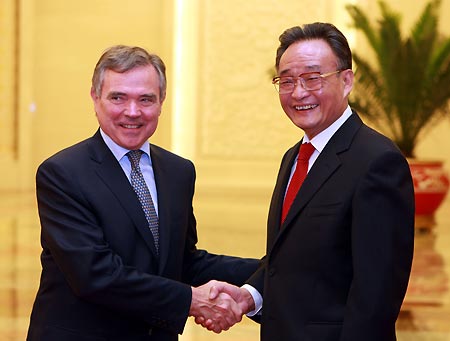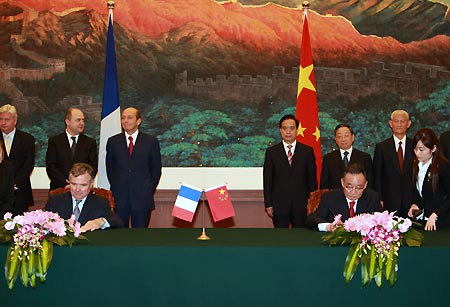China persists in long-term friendship with France, and will not change its policy of deepening bilateral comprehensive strategic partnership, said top legislator Wu Bangguo?in Beijing on?Monday.
 |
|
Wu Bangguo (R), chairman of the Standing Committee of China's National People's Congress (NPC), meets with French National Assembly President Bernard Accoyer in Beijing, capital of China, April 20, 2009. [Ju Peng/Xinhua] |
Wu, chairman of the Standing Committee of the National People's Congress (NPC), the country's top legislature, made the remarks when holding talks with Speaker of the French National Assembly Bernard Accoyer.
China would work with France, in line with the principles of the recent press communique, to increase pragmatic cooperation in various fields, and jointly cope with the financial crisis and other global challenges, in an effort to contribute to world peace, stability and development, Wu said.
China and France issued a press communique on April 1, saying the two sides "attach great importance to China-France relations" and reiterating adherence to the principle of non-interference in each other's internal affairs.
In the communique, France pledged not to support "Tibet independence" in any form.
This pledge had helped Sino-French ties resume, Wu said.
 |
|
Wu Bangguo (2nd R Front), chairman of the Standing Committee of China's National People's Congress, and French National Assembly President Bernard Accoyer (1st L Front) sign a memorandum of understanding between China's National People Congress and the French National Assembly, in Beijing, capital of China, April 20, 2009. Ju Peng/Xinhua] |
Chinese President Hu Jintao and his French counterpart Nicolas Sarkozy met in London ahead of the Group of 20 summit on the global financial crisis. "This opened a new chapter in bilateral relations," Wu noted.
Relations deteriorated in December when Sarkozy met with the Dalai Lama in Poland.
Wu said any person of insight would not be pleased to see the severe difficulties that appeared in Sino-French ties at that time.
Echoing Wu, Accoyer reaffirmed France's adherence to the one-China policy and the position that Tibet is an inalienable part of the Chinese territory. France refused to support "Tibet independence" in any form, he said. He added that this "firm stance" would remain unchanged.
Wu applauded Accoyer's statement.
As to parliament-to-parliament relations, Wu hoped that the two sides would maintain exchanges between top leaders, special committees and friendship groups, promote cooperation in various fields, and deepen coordination in international parliamentary organizations.
This would help enrich Sino-French ties, he noted.
As to China-EU relations, Wu said he hoped that France would continue playing a constructive role in the European Union to encourage it to treat relations with China from a strategic, long-term perspective, take China's major concerns into consideration, and increase dialogue and cooperation with China in line with mutual respect and equality.
China was ready to work with France and other EU members to jointly push forward the healthy, stable growth of China-EU relations, Wu said.
Agreeing with Wu's suggestions, Accoyer said France valued relations with China and would work to increase win-win cooperation and promote the bilateral strategic partnership.
The French National Assembly was ready to strengthen cooperation with the NPC to help promote relations, he noted.
After the talks, Wu and Accoyer signed a memorandum of understanding on the establishment of regular exchange mechanism between the legislatures.
Accoyer came to China for a visit from April 19 to 26 at the invitation of Wu.
(Xinhua News Agency April 21, 2009)